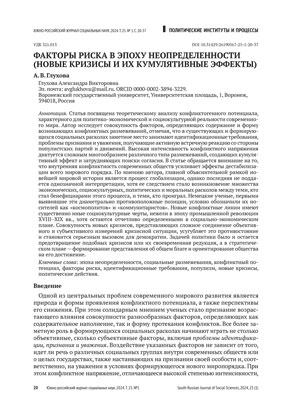Abstract
The article presents the results of a comprehensive theoretical analysis of the current risks to the political, economic, and socio-cultural reality. The author examines the set of factors that determine the content and form of emerging conflict divisions, noting that in existing and emerging social cleavages, identification demands, problems of recognition and respect occupy a prominent place. These issues elicit an active counter-reaction from populist parties and movements. The intensity of the conflict is shaped by the multitude of interwoven cleavages which create a cumulative effect that makes it challenging to achieve consensus. The paper stresses that the internal conflicts of contemporary societies intensify the destabilizing effects of the global order. In the author’s opinion, the main explanatory framework of recent world history is the process of globalization, but the latter does not lend itself to an unambiguous interpretation, although it has resulted in the emergence of a multitude of economic, socio-cultural, political and moral cleavages between those who have benefited and those who have lost. German scholars, who were the first to identify these diametrically opposed positions, conventionally labeled their bearers as “cosmopolitans” and “communitarians”. The new conflict lines have significantly different socio-cultural features from those of the industrial revolution of the 18th‑19th centuries, in terms of socio-economic factors. The set of new crises, representing a complex combination of objective and subjective dimensions of the crisis situation, intensifies the confrontation and becomes a serious challenge to democratic systems. The major objective of politics has been and remains the prevention of such crises or their timely reduction; strategically, it lies in articulating a vision of the common good and guiding society towards its realization.
Keywords
References
Арбатов, А.Г. (2022). Украинский кризис и стратегическая стабильность. ПОЛИС. Политические исследования, 4, 10–31. DOI: 10.17976/jpps/2022.04.03
Вайнштейн, Г.И. (2017). Современный популизм как объект политологического анализа. ПОЛИС. Политические исследования, 4, 69–89. DOI: 10.17976/jpps/2017.04.05
Вебер, М. (2017). Политика как призвание и профессия. Mосква: RIPOL классик.
Глухова, А.В. (2017). Популизм как политический феномен: вызов современной демократии. ПОЛИС. Политические исследования, 4, 49–68. DOI: 10.17976/jpps/2017.04/05
Глухова, А.В. (2020). Политические конфликты в глобальную эпоху (к проблеме теоретической идентификации). Политическая наука, 3, 11–33.
Глухова, А.В. (2022). Новые кризисы, социальные размежевания, дискурсивные конфликты и проблема общественного единства в XXI веке. Политическая наука, 3, 36–56. DOI: 10.31249/poln/2022.03.ХХ
Дуткевич, П., Казаринова, Д. (2017). Страх как политика. ПОЛИС. Политические исследования, 4, 8–21. DOI: 10.17976/jpps/2017.04.02
Закария, Ф. (2009). Постамериканский мир. Москва: Издательство «Европа».
Кувалдин, В. (2017). Глобальный мир. Политика. Экономика. Социальные отношения. Москва: Издательство «Весь Мир».
Пабст, А. (2021). Цивилизация и либеральная демократия. ПОЛИС. Политические исследования, 4, 26–42. DOI: 10.17976/jpps/2021.04.04
Семененко, И.С., Лапкин, В.В., Пантин, В.И. (2021). Социальные размежевания и политические противостояния в научном дискурсе: критерии оценки и классификации. ПОЛИС. Политические исследования, 5, 56–77. DOI: 10.17976/jpps/2021.05.05
Фукуяма, Ф. (2019). Идентичность: Стремление к признанию и политика неприятия. Москва: Альпина Паблишер.
Хиршман, А.О. (2021). Риторика реакции: извращение, тщетность, опасность. Москва: Изд. дом Высшей школы экономики.
Чижевский, К., Куляс, И., Голюбевский, М. (ред.). (2015). Руководство по диалогу. Сейны: Фонд «Пограничье» и Центр «Пограничье — искусств, культур, народов».
Шмитт, К. (1992). Понятие политического. Вопросы социологии, 1, 37–68.
Dahrendorf R. (2004). Der Wiederbeginn der Geschichte. Vom Fall der Mauer zum Krieg im Irak. Reden und Aufsatze. Muenchen: Verlag C.H. Beck, oHG.
Dahrendorf, R. (1998). Anmerkungen zu Globalisierung. In U. Beck (Ed.) Perspektivender Weltgesellschaft (pp. 41–54). Frankfurt am Main.
Die neue Konfliktlinie und die Rolle des Politischen. Gespräch mit Wolfgang Merkel, Michael Zürn. (2019). Retrieved from https://www.frankfurter-hefte.de/artikel/die-neue-konfliktlinie-und-die-rolle-des-politischen‑2750
Habermas, J. (1981) Theorie des Kommunikativen Handelns. Frankfurt am Main.
Hartz, C., Boehnke, K. (2023). Kitt der Gesellschaft. Dimensionen und Wirkungen sozialen Zusammenhalts. Retrieved from https://www.frankfurter-hefte.de/artikel/kitt-der-gesellschaft‑3629
Heidenreich, F. (2023). Wie Lässt sich Zuversicht Zurück Gewinnen? Demokratische Zukünfte. Frankfurter Hefte. Retrieved from https://www.frankfurter-hefte.de/artikel/demokratische-zukuenfte‑3711/
Kronenberg, V. (2013). Was Halt die Gesellschaft Zusammen? Ein Blick Zurück Nach Vorn. Aus Politik und Zeitgeschichte, 3–4.
Merkel, W. (2021a). Moralisierung und Polarisierung als Gesellschaftliche Signatur. Neue Gesellschaft, 8. Retrieved from https://www.frankfurter-hefte.de/artikel/moralisierung-und-polarisierung-als-gesellschaftliche-signatur-3240/
Merkel, W. (2021b). Neue Krisen. Wissenschaft, Moralisierung und die Demokratie im 21. Jahrhundert. Aus Politik und Zeitgeschichte, 26/27, 4–11.
Merkel, W. (2022). Über die Moralische Verengung Unserer Diskurse. Die Nervöse Republik. Frankfurter Hefte, 6, 44–48.
Merkel, W. (2023). Der Faktor Zeit in der Ära Multipler Krisen in Europa. Demokratie unter Druck. Frankfurter Hefte. Retrieved from https://www.frankfurter-hefte.de/artikel/demokratie-unter-druck‑3664-1
Meyer, T. (2022). Jürgen Habermas über das Destruktive Potenzial “Sozialer” Medien. Noch ein Strukturwandel der Öffentlichkeit. Neue Gesellschaft, 1. Retrieved from https://www.frankfurter-hefte.de/artikel/noch-ein-strukturwandel-der-oeffentlichkeit-3356/
Münkler, H. (2022). Eine Ära der Ungewissheit. Frankfurter Hefte. Retrieved from https://www.frankfurter-hefte.de/artikel/eine-aera-der-ungewissheit‑3338
Neef, T., Chancel, L. (2022). Wie Ungleich ist die Welt? Ergebnisse des World Inequality Report 2022. Aus Politik und Zeitgeschichte, 37/38, 29–39.
Schroeder, W. (2023). Damit aus Polarisierung nicht Feindschaft wird. Frankfurter Hefte. Retrieved from https://www.frankfurter-hefte.de/artikel/damit-aus-polarisierung-nicht-feindschaft-wird‑3627/21.03.2023
Steiner, N.D., Schimpf, C.H., Wuttke, A. (2023). Abgehängt und im Populismus Vereint? Die Vielfältigen Wurzeln des Populismus im Gefühl Fehlender Gesellschaftlicher Anerkennung. Politische Vierteljahressschrift, 64, 107–132.
Teney, C. (2019). Über die Kluft Zwischen Kosmopolitischen und kommunitaristischen Einstellungen in der Gesellschaft. Distanzierung, Mobilisierung, Politisierung. Frankfurter Hefte. Retrieved from https://www.frankfurter-hefte.de/ausgabe/gespaltene-gesellschaft‑1/


